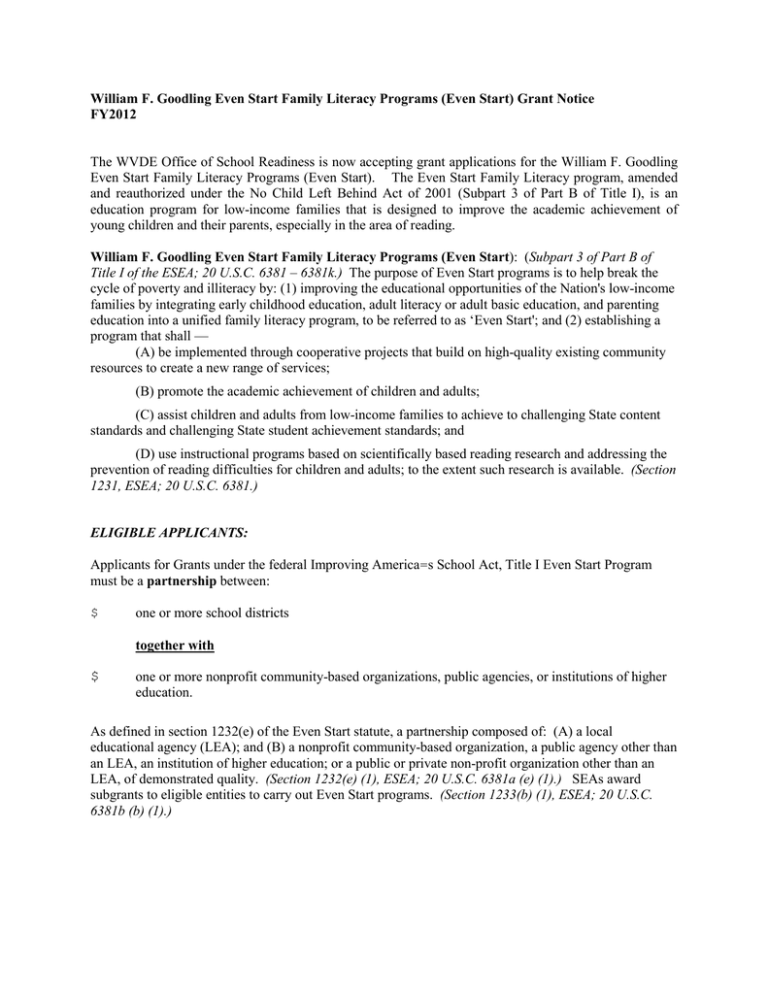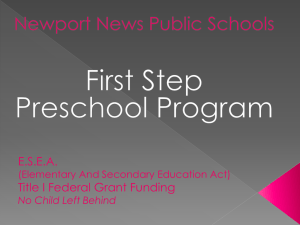William F. Goodling Even Start Family Literacy Programs (Even Start)... FY2012 The WVDE Office of School Readiness is now accepting grant...
advertisement

William F. Goodling Even Start Family Literacy Programs (Even Start) Grant Notice FY2012 The WVDE Office of School Readiness is now accepting grant applications for the William F. Goodling Even Start Family Literacy Programs (Even Start). The Even Start Family Literacy program, amended and reauthorized under the No Child Left Behind Act of 2001 (Subpart 3 of Part B of Title I), is an education program for low-income families that is designed to improve the academic achievement of young children and their parents, especially in the area of reading. William F. Goodling Even Start Family Literacy Programs (Even Start): (Subpart 3 of Part B of Title I of the ESEA; 20 U.S.C. 6381 – 6381k.) The purpose of Even Start programs is to help break the cycle of poverty and illiteracy by: (1) improving the educational opportunities of the Nation's low-income families by integrating early childhood education, adult literacy or adult basic education, and parenting education into a unified family literacy program, to be referred to as ‘Even Start'; and (2) establishing a program that shall — (A) be implemented through cooperative projects that build on high-quality existing community resources to create a new range of services; (B) promote the academic achievement of children and adults; (C) assist children and adults from low-income families to achieve to challenging State content standards and challenging State student achievement standards; and (D) use instructional programs based on scientifically based reading research and addressing the prevention of reading difficulties for children and adults; to the extent such research is available. (Section 1231, ESEA; 20 U.S.C. 6381.) ELIGIBLE APPLICANTS: Applicants for Grants under the federal Improving America=s School Act, Title I Even Start Program must be a partnership between: $ one or more school districts together with $ one or more nonprofit community-based organizations, public agencies, or institutions of higher education. As defined in section 1232(e) of the Even Start statute, a partnership composed of: (A) a local educational agency (LEA); and (B) a nonprofit community-based organization, a public agency other than an LEA, an institution of higher education; or a public or private non-profit organization other than an LEA, of demonstrated quality. (Section 1232(e) (1), ESEA; 20 U.S.C. 6381a (e) (1).) SEAs award subgrants to eligible entities to carry out Even Start programs. (Section 1233(b) (1), ESEA; 20 U.S.C. 6381b (b) (1).) LOCAL PARTICIPANTS IN EVEN START: As defined in the ESEA, services provided to participants on a voluntary basis that are of sufficient intensity in terms of hours, and of sufficient duration, to make sustainable changes in a family, and that integrate all of the following activities: (A) Interactive literacy activities between parents and their children. (B) Training for parents regarding how to be the primary teacher for their children and full partners in the education of their children. (C) Parent literacy training that leads to economic self-sufficiency. (D) An age-appropriate education to prepare children for success in school and life experiences. (Section 9101(20), ESEA; 20 U.S.C. 7801(20).) Each of these core components is considered an instructional program. (Even Start guidance, “Background” and “Local Administration/Program Elements/High-Quality, Intensive Instructional Programs.”) All Even Start local projects must use their Even Start subgrant funds to pay the Federal share of the cost of providing intensive family literacy services for eligible participants. (Section 1234(a), ESEA; 20 U.S.C. 6381c(a).) And $ Include children 0 - 8 years of age in quality educational programs. $ And $ Include parents who participate (or are eligible to participate) in the Adult Basic Education program under the Adult Education Act. Among the required program elements that each Even Start project must provide is that they must recruit, screen, and provide services to eligible families that are “most in need” of Even Start services, as indicated by a low level of income, a low level of adult literacy or English language proficiency of the eligible parent or parents and other need-related indicators. (Section 1235(1) and (14), ESEA; 20 U.S.C. 6381d(1) and (14).) A complete grant application can be requested by contacting: W. Clayton Burch Assistant Director Office of School Readiness West Virginia Department of Education Building #6, Room 603 Charleston, West Virginia 25305-0330 304-558-5325 wburch@access.k12.wv.us Complete grant application must be received by April 1, 2011.



